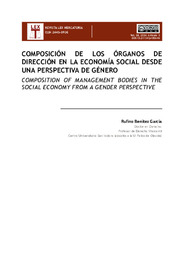Por favor, use este identificador para citar o enlazar este ítem:
https://hdl.handle.net/11000/35683Registro completo de metadatos
| Campo DC | Valor | Lengua/Idioma |
|---|---|---|
| dc.contributor.author | Benítez García, Rufino | - |
| dc.contributor.other | Departamentos de la UMH::Ciencia Jurídica | es_ES |
| dc.date.accessioned | 2025-02-19T08:28:36Z | - |
| dc.date.available | 2025-02-19T08:28:36Z | - |
| dc.date.created | 2024 | - |
| dc.identifier.citation | Revista Lex Mercatoria | es_ES |
| dc.identifier.issn | 2445-0936 | - |
| dc.identifier.uri | https://hdl.handle.net/11000/35683 | - |
| dc.description.abstract | La igualdad de género constituye uno de los pilares del movimiento cooperativo, y es fundamento de las medidas que se promueven desde la administración pública. Sin embargo, la eficacia de dichas medidas no se ha materializado en la práctica, dado que el número de mujeres que ocupan puestos de alta gestión en el seno de la sociedad cooperativa dista mucho del pretendido por el legislador, debido a la pervivencia de estereotipos, prejuicios y roles que pueden disuadir al sector femenino del ejercicio de determinadas funciones directivas. | es_ES |
| dc.description.abstract | Gender equality is one of the pillars of the cooperative movement, and is the basis of the measures promoted by the public administration. However, the effectiveness of these measures has not materialized in practice, given that the number of women who occupy senior management positions within the cooperative society is far from that intended by the legislator, due to the persistence of stereotypes, prejudices and roles that can dissuade the female sector from exercising certain managerial functions. In this sense, the very nature of the Social Economy invites us to think that they present conditions that favour the presence of women in their management bodies. In particular, cooperatives are seen as models adjusted to women’s needs and expectations, in accordance with the transversal principles and values that inspire their philosophy, due to the greater direct involvement of women in social management | es_ES |
| dc.format | application/pdf | es_ES |
| dc.format.extent | 19 | es_ES |
| dc.language.iso | spa | es_ES |
| dc.publisher | Universidad Miguel Hernández | es_ES |
| dc.relation.ispartofseries | 28 | es_ES |
| dc.rights | info:eu-repo/semantics/openAccess | es_ES |
| dc.rights | Attribution-NonCommercial-NoDerivatives 4.0 Internacional | * |
| dc.rights.uri | http://creativecommons.org/licenses/by-nc-nd/4.0/ | * |
| dc.subject | Economía Social | es_ES |
| dc.subject | Brecha de género | es_ES |
| dc.subject | Órganos de dirección | es_ES |
| dc.subject | Papel de la mujer | es_ES |
| dc.subject | Paridad | es_ES |
| dc.subject | Social economy | es_ES |
| dc.subject | Gender gap | es_ES |
| dc.subject | Management bodies | es_ES |
| dc.subject | Role of women | es_ES |
| dc.subject | Parity | es_ES |
| dc.subject.other | CDU::3 - Ciencias sociales::34 - Derecho::340 - Cuestiones generales de derecho. Métodos y ciencias auxiliares del derecho | es_ES |
| dc.title | Composición de los órganos de dirección en la economía social desde una perspectiva de género | es_ES |
| dc.type | info:eu-repo/semantics/article | es_ES |
| dc.relation.publisherversion | https://orcid.org/0000-0002-9544-8224 | es_ES |

Ver/Abrir:
3.+La+baja+presencia+femenina+en+los+órganos+de+dirección+de+las+entidades+de+economía+social.pdf
310,93 kB
Adobe PDF
Compartir:
 La licencia se describe como: Atribución-NonComercial-NoDerivada 4.0 Internacional.
La licencia se describe como: Atribución-NonComercial-NoDerivada 4.0 Internacional.
.png)